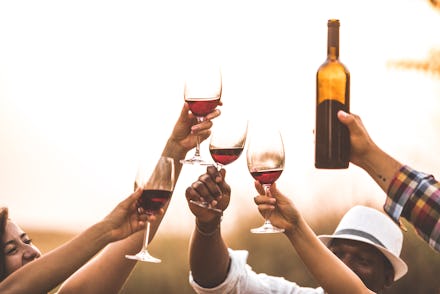The natural wine world is white as hell. These BIPOC sommeliers are changing that

What’s whiter: a riesling, a Gewürztraminer, or the people who make either of them? That might feel like a pretty blatant jab but face it, the wine industry has historically been an overwhelmingly caucasian institution. This, thankfully, is shifting, with more BIPOC joining the ranks, becoming sommeliers, holding wine tastings, and running their own wine brands. But as more of us develop a preference for natural and organic wines, there’s yet another layer to penetrate for wine-heads of color. Slowly but surely, though, BIPOC are carving their own niche within a niche in the natural wine world.
A 2018 survey by SevenFifty Daily of more than 3,100 professionals in the wine industry found that 84 percent of respondents were white, and only 2 percent identified as Black. And that’s just in the broader wine industry, so you can imagine how homogenous the demographic make up the natural wine industry is, especially outside of the more ethnically diverse New York, as one member of the wine community in California notes.
“I have found that I was the only woman in the room, the only person of color in the room, and sometimes the only queer person. It was really surprising for me,” says Jirka Jireh, an Oakland-based sommelier, wine educator, and creator of Industry Sessions, an Instagram series aimed at offering support to BIPOC interested in wine, her way of effectively decolonizing the industry one pour at a time.
Unfortunately, it’s wildly unbelievable to some people that a woman of color could be deeply educated about wine. It was this not-so-subtle racism that lead Jireh to start reaching out to marginalized folks, whether they walked into the wine shop she worked at or if she saw them out at a wine tasting event. "I always just had this focus on community building. I think it's really important for success to have people to lean on," she says.
As this transformation within the industry begins, the roles of newly minted wine educators of color sometimes appear nebulous to the consumer. “Many people ask me quite often, ‘am I actually the winemaker?’“ says Nicole Kearney, owner of Indianapolis-based natural wine label Sip & Share wines. All of Kearney’s wines are vegan, meaning they don’t use any animal byproducts in their winemaking process, their product, or its packaging. They’re natural but certified organic, since there’s one ingredient that they use and is considered inorganic. “We give the wines a little help with commercial yeast, but don’t add any other extras to the wine,” Kearney says. “I’m not sure if you know this, but typical wine can have up to 70 different additives.”
Kearney schooled me with facts, ingredients, and processes about wine I never knew — egg whites, crustacean shells, fish bladder, and milk, all which actually can be found in some wines. It was enlightening and that’s ultimately her goal: to empower and educate POCs who love wine so they can have a better, more responsible siping experience. Especially for disenfranchised groups who haven’t felt welcome into an uptight and exclusive industry, this is freeing.
The ride to becoming this knowledgeable, Kearny tells me, wasn’t without bumps. She recalls an incident where she was taking a wine glass, and a teacher grilled her in front of the rest of the class about, of all things, cat pee (a real tasting note in wine). That she was expected to know about cat pee notes wasn’t the crazy part; the true injustice was being in a classroom setting where she didn’t feel nurtured. Her story speaks to similar experiences with many other Black women in the wine industry. And undoing those roadblocks are important since equality in the culinary world goes far beyond food security. We deserve access to and knowledge about the nicer things too.
“Not only do we make wine, but what we do is create community with it. We have cultivated this very inviting, non-judgmental space where we center Black and brown wine consumers, but we welcome everyone to the table,” Kearney says, noting that she has a diverse customer base.
Jireh asserts that it’s time for us to let go of the Eurocentric bullshit that’s intertwined with wine. “To decolonize the wine industry is to celebrate everyone's diverse palette. It's a reflection of our upbringing is a reflection of everything we've been through as people. And it should be recognized and celebrated by all,” she says. With variety breeds innovation, after all. Let’s get out of our comfort zones and take a sip from a 2021 bottle of reality, shall we?